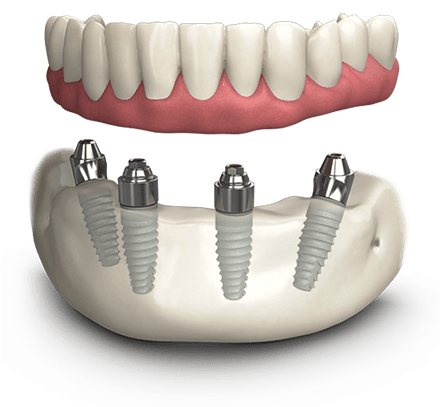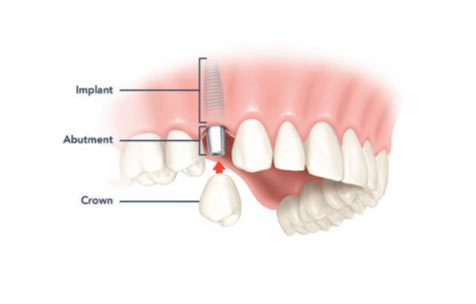Menu
Tooth loss can significantly impact an individual’s appearance, self-assurance, and speech, while also exerting added strain on the remaining teeth.
Visualise a balanced arrangement of teeth both above and below, harmoniously aligned. Removing a single tooth disrupts this balance, altering the bite and creating uneven pressure on specific teeth.
This imbalance can result in premature wear and potential issues, underscoring the essentiality of replacing lost teeth.
Well in a nutshell, they are new teeth roots placed where a natural tooth was lost in the bone. There is a whole array of different types of dental implants out there on the market.
They vast majority are made of titanium however the newer ones becoming more popular are made of zirconia! How cool, metal-free implants!


A dental implant is essentially made in 3 parts.


Implants can also be utilised in full denture wearers.
Removable dentures do have their purpose, but many patients would love to get rid of them. Implants are more secure and can totally replace dentures. No more using denture fix cream and you wouldn’t have to worry again about loose dentures when you laugh or eat.
So, denture implants, famously called ‘All on 4’ are the types of implants that replace all of the natural teeth in the one arch,
We work with specialist oral surgeons and periodontists in these cases to achieve the best functional and aesthetic outcome.
At your consult, a full examination is carried out where we check if the natural teeth are healthy. This is needed as if a neighbouring tooth to a space where an implant is to be placed, doesn’t have a great outlook, then this tooth would be included into the implant planning. A 3 D bone scan is required to survey the underlying bone with the latest implant software. This allows us to plan implant placement easily and precisely.
Titanium implants are surgically placed into the bone (don’t fret it’s so easy) and left for 2 months before the final implant tooth is attached. An impression is needed to make the custom-fitted crown that is screwed onto the implant itself.
It’s the next best thing to having your own natural tooth back again. So, these implants can replace one solo missing tooth or several in the form of an implant-retained bridge.
Once you have finished your implant treatment, the maintenance starts here. You have to treat your implant(s) with the utmost care. Regular dental visits are crucial, especially in the first 6 to 12 months after placement. Any changes in the mouth will put new pressures on the implant which will need to be checked and adjusted accordingly.
We are strong believers in post-operative care. You will be given clear instructions and demonstrations on how to look after your implant, so it will look after you!
All on 4 is a procedure replacing a failing dentition with 4 to 6 implants which holds a full set of prosthetic teeth.
This not only gives full function back, but fundamentally improves confidence and self-esteem. For most patients, it is life changing.
No, there is very little discomfort, if planned and managed well.
Some of our patients reported feeling less pain than having a tooth removed and some didn’t even need painkillers afterwards.
Never, in fact we advise implants over dentures in most cases.
Those who have pre-existing health issues such as diabetics, active periodontal disease, heavy smokers and heavy grinders.
Alternatives are a tooth supported dental fixed bridge or removable dentures. Book in for your implant consultation today and let’s discuss your options.
Implant failure is rare, but it happens, so we are very strict with our patient assessment and policy for implant suitability. In addition, we follow stringent infection controls throughout the entire implant journey.
Depending on your cover, most health funds will cover implants under major dental. Terms & Conditions apply with all insurance policies so it is best to contact your fund to check what you are covered for.
Over the decades they have certainly come down in price, so you will typically expect to pay between $4000-6000 for one solo implant and the restoration crown. Extra costs involved are bone grafting (bone augmentation) but your dentist will discuss if this is required at consultation.
Give us a call on (03)9589 4472 or book online for a consultation.